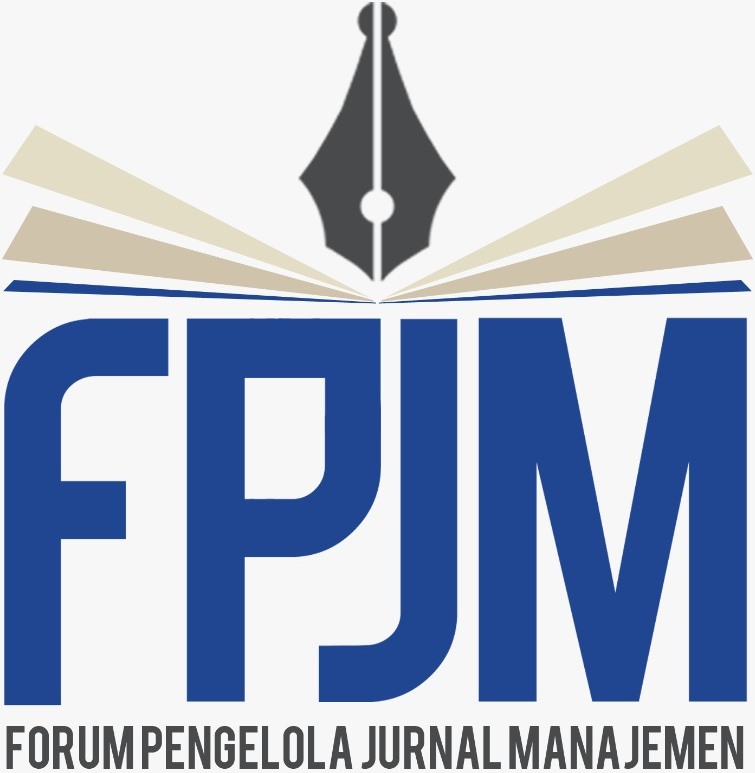STRATEGI PENINGKATAN KINERJA PEGAWAI MELALUI PENGUATAN KOMUNIKASI INTERPERSONAL, IKLIM ORGANISASI, DAN MOTIVASI KERJA
Abstract
ABSTRAK
Tujuan dari penelitian ini adalah untuk menguji pengaruh langsung dari penguatan komunikasi interpersonal dan iklim organisasi terhadap kinerja pegawai serta menguji pengaruh intervening dari motivasi kerja terhadap kinerja pegawai. Populasi penelitian terdiri dari seluruh ASN organisasi dengan nilai Sistem Akuntabilitas Kinerja Instansi Pemerintahan (SAKIP) BB sebanyak 309 orang. Jumlah populasi ditentukan menggunakan rumus Slovin sehingga diperoleh 173 sampel penelitian. Data diuji menggunakan path analysis (analisis jalur). Hasil penelitian menunjukkan bahwa komunikasi interpersonal dan iklim organisasi baik secara langsung maupun tidak langsung mempengaruhi kinerja pegawai. Dengan demikian, hasil penelitian ini mengindikasikan bahwa intervensi pada komunikasi interpersonal dan iklim organisasi memberikan efek ganda, yaitu dampak langsung terhadap kinerja sekaligus efek intervening melalui peningkatan motivasi kerja. Rekomendasi implementasinya meliputi tiga aspek utama, yaitu melalui pengembangan kompetensi, pemantauan lingkungan organisasi, dan mekanisme motivasi berbasis performa.
ABSTRACT
The purpose of this study was to examine the direct effect of strengthening interpersonal communication and organizational climate on employee performance and to examine the intervening effect of work motivation on employee performance. The study population consisted of all ASN organizations with a Government Agency Performance Accountability System (SAKIP) BB value of 309 people. The population size was determined using the Slovin formula to obtain 173 research samples. The data were tested using path analysis. The results showed that interpersonal communication and organizational climate both directly and indirectly affect employee performance. Thus, the results of this study indicate that interventions on interpersonal communication and organizational climate have a dual effect, namely a direct impact on performance as well as an intervening effect through increased work motivation. The implementation recommendations include three main aspects, namely through competency development, monitoring the organizational environment, and performance-based motivation mechanisms.
Keywords
References
Aryadillah, A. (2018). Pengaruh iklim organisasi dan motivasi kerja karyawan terhadap kinerja karyawan pada pt midi utama indonesia tbk. Cakrawala, 18(2), 157–170. https://doi.org/10.31294/jc.v18i2.
Colquitt, J. A., Lepine, J., & Wesson, M. (2014). Organizational Behavior: Improving Performance and Commitment in the Workplace (4ed). McGraw-Hill.
Fomenky, N. F. (2015). The impact of motivation on employee performance. In Global Conference on Business & Finance Proceedings, 10(1), 332-336.
Ghozali, I. (2018). Aplikasi Analisis Multivariate dengan Program IBM SPSS 25 Edisi 9. Badan Penerbit Universitas Diponegoro.
Hanum, F. (2023). Peningkatan Kinerja Karyawan Melalui Penguatan Kepemimpinan Transformasional, Dukungan Organisasi dan Motivasi Kerja. Universitas Pakuan.
Harahap, F., & Rusdinal. (2017). The influence of principal managerial competency toward teachers productivity with mediation of organizational citizenship behavior and interpersonal communication. Advances in Economics, Business and Management Research, 45, 290-299. https://doi.org/10.2991/coema-17.2017.50.
Hardhienata, S. (2017). The development of scientific identification theory to conduct operation research in education management. IOP Conference Series: Materials Science and Engineering, 166(1), 1-7. https://doi.org/10.1088/1757-899X/166/1/012007.
Kissi, E., Asare, O. A., Agyekum, K., Agyemang, D. Y., & Labaran, M. (2019). Ascertaining the Interaction Effects Among Organisational Citizenship Behavior, Work Overload and Employees’ Performance in the Ghanaian Construction Industry. International Journal of Productivity and Performance Management, 68, 1235-1249. https://doi.org/10.1108/IJPPM-07-2018-0262.
Kustrianingsih, R., M. Minarsih, M., M. Hasiolan, B., L. (2016). Pengaruh Motivasi Kerja, Kepemimpinan, dan Iklim Organisasi terhadap Kinerja Karyawan Studi Kasus Dinas Kebudayaan dan Pariwisata. Jounal of Management, 2(2).
Luky, A. Z., Kurniawati, T., & Cerya, E. (2021). The effect of interpersonal communication and work motivation on employee performance in Padang City regional company offices (PDAM). Seventh Padang International Conference On Economics Education, Economics, Business and Management, Accounting and Entrepreneurship (PICEEBA 2021), 367–375. https://doi.org/10.2991/aebmr.k.211117.083.
Mappamiring, M., Akob, M., & Putra, A. H. P. K. (2020). What millennial workers want? Turnover or intention to stay in the company. Journal of Asian Finance, Economics and Business, 7(5), 237–248. https://doi.org/10.13106/JAFEB.2020.VOL7.NO5.237.
Nazili, I. (2012). Pengaruh gaya kepemimpinan dan iklim organisasi terhadap kinerja karyawan: motivasi kerja sebagai variabel intervening (studi pada karyawan pt garuda indonesia kota semarang). Undergraduate thesis, Fakultas Ekonomika dan Bisnis Universitas Diponegoro Semarang.
Osro, Z., Lumbanraja, P., Salim, S. R. A., & Absah, Y. (2018). The analysis of personality and work ability on the performance of outsourcing employees with work motivation as an intervening variable at Pt Inalum (Persero) in Kuala Tanjung. In: Academic journal of economic studies, 4(2), 90 – 104.
Paais, M. & Pattiruhu, J.R. (2020). Effect of motivation, leadership, and organizational culture on satisfaction and employee performance. The Journal of Asian Finance, Economics and Business, 7(8), 577-588. https://doi.org/10.13106/jafeb.2020.vol7.no8.577.
Reb, J., Chaturvedi, S., Narayanan, J. et al. (2019). Leader mindfulness and employee performance: a sequential mediation model of lmx quality, interpersonal justice, and employee stress. J Bus Ethics 160, 745–763. https://doi.org/10.1007/s10551-018-3927-x.
Rexady, V. G., Lestari, P., & Prayudi, P. (2023). Pengaruh komunikasi interpersonal dan gaya kepemimpinan melalui motivasi kerja terhadap kinerja karyawan. Jurnal Ilmu Komunikasi, 21(2), 226-240. https//doi.org/10.31315/jik.v21i2.10146.
Rimbayana, T. A. K., Erari, A., Aisyah, S. (2022). The Influence of Competence, Cooperation and Organizational Climate on Employee Performance With Work Motivation as a Mediation Variable (Study on the Food and Agriculture Office Clump of Merauke Regency). Technium Social Sciences Journal, 27(2022), 556-578. https://doi.org/10.47577/tssj.v27i1.5200.
Sihabudin, S., & Mulyadi, D. (2020). Effect of Interpersonal Communication and Motivation on Employee Work Effectiveness in BAPPEDA, Karawang Regency. Webology, 17(2), 244–261. https://doi.org/10.14704/WEB/V17I2/WEB17028.
Wulandari, R. (2019). Pengaruh kepemimpinan transformasional dan kepuasan kerja terhadap organizational citizenship behavior dengan komitmen organisasi sebagai variabel intervening (studi empiris pada PT. Telkom Magelang). Prosiding 2nd Business and Economics Conference In Utilizing of Modern.
Wonodipho, A., R. (2019). Establishing interpersonal communication and organizational climate to improve work motivation. Jurnal Kepempinan Pendidikan Uhamka, 2(1), 218-232. https://doi.org/10.22236/jkpuhamka.v2i1.3816.
DOI: 10.34203/jimfe.v11i1.10868
Refbacks
- There are currently no refbacks.
Copyright (c) 2025 The Author(s)

This work is licensed under a Creative Commons Attribution-NonCommercial-ShareAlike 4.0 International License.











